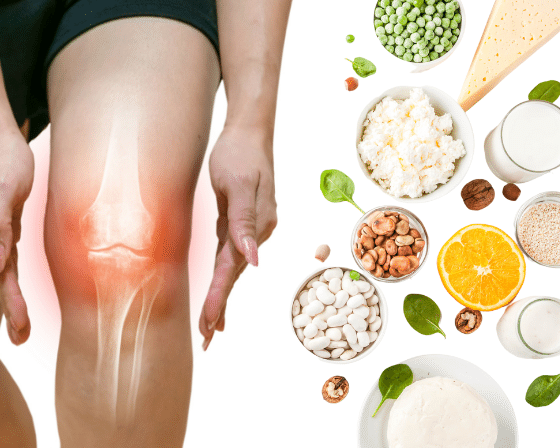Strong bones are the foundation of a healthy life. As we age, maintaining bone strength becomes crucial in preventing fractures, osteoporosis, and other bone-related issues. According to Dr. Potla Sivaiah, the best orthopaedic surgeon in Guntur, following a balanced diet rich in bone-strengthening nutrients is essential for overall health and mobility. At Shri Ramchandra Joint Replacement Centre, also known as Happy Hospitals, the best orthopaedic hospital in Guntur, the focus is on not just treating orthopaedic issues but also promoting preventive care through lifestyle and dietary advice.
In this blog, we’ll explore the best diet for stronger bones and how the expertise of Dr. Potla Sivaiah and the advanced care at Happy Hospitals can help you maintain bone health.
1. Calcium-Rich Foods
Calcium is the building block of bones. A diet high in calcium helps maintain bone density and strength. Adults typically need around 1,000 mg of calcium per day, while older adults may need up to 1,200 mg.
Calcium-Rich Foods Include:
- Dairy Products: Milk, yogurt, and cheese are excellent sources of calcium.
- Leafy Green Vegetables: Spinach, kale, and collard greens provide a good amount of calcium.
- Fortified Foods: Some cereals, bread, and plant-based milk (such as almond or soy milk) are fortified with calcium.
Tip from Dr. Potla Sivaiah: Incorporating dairy into your daily meals is a great way to ensure you’re meeting your calcium needs. If you’re lactose intolerant, fortified plant-based alternatives can be equally effective.
2. Vitamin D: The Sunshine Vitamin
Vitamin D plays a vital role in calcium absorption, and without it, bones can become weak and brittle. Sun exposure is the most natural way to get Vitamin D, but it is also found in various foods.
Vitamin D-Rich Foods Include:
- Fatty Fish: Salmon, mackerel, and sardines are high in Vitamin D.
- Egg Yolks: A versatile addition to your diet for boosting Vitamin D levels.
- Fortified Foods: Milk, orange juice, and cereals often have added Vitamin D.
Expert Advice from Happy Hospitals: For individuals who cannot get enough sunlight, Vitamin D supplements may be recommended. Regular check-ups with your orthopaedic specialist can help you maintain adequate levels.
3. Protein for Bone Health
Protein is crucial for bone structure. A diet low in protein may affect bone density and muscle strength, increasing the risk of fractures, especially in older adults.
Protein-Rich Foods Include:
- Lean Meats: Chicken, turkey, and lean beef.
- Plant-Based Options: Beans, lentils, and tofu are great protein sources for vegetarians.
- Dairy Products: In addition to calcium, dairy provides a significant amount of protein.
Dr. Potla Sivaiah’s Recommendation: Aim for a balanced intake of both animal and plant-based proteins to ensure optimal muscle and bone health.
4. Magnesium and Zinc: The Unsung Heroes
Both magnesium and zinc play crucial roles in bone formation and maintenance. Magnesium helps convert Vitamin D into its active form, while zinc promotes bone mineralization.
Magnesium and Zinc-Rich Foods Include:
- Nuts and Seeds: Almonds, walnuts, and pumpkin seeds.
- Whole Grains: Brown rice, oats, and quinoa.
- Green Vegetables: Broccoli and Swiss chard are good sources of magnesium.
Happy Hospitals’ Nutrition Insight: Including nuts and green vegetables in your diet not only benefits your bones but also promotes overall health, aiding in digestion and cardiovascular health.
5. Foods High in Omega-3 Fatty Acids
Omega-3 fatty acids have anti-inflammatory properties that help reduce bone loss and improve bone density.
Sources of Omega-3 Fatty Acids Include:
- Fatty Fish: Salmon, mackerel, and sardines.
- Flaxseeds and Chia Seeds: Plant-based sources rich in omega-3s.
- Walnuts: A convenient snack option for a quick omega-3 boost.
Tip from Dr. Potla Sivaiah: Incorporate fish into your diet at least twice a week, or opt for omega-3 supplements if you follow a vegetarian or vegan lifestyle.
6. Limit Salt and Caffeine Intake
Excessive salt and caffeine can lead to calcium loss, weakening bones over time. It’s important to balance your diet and avoid consuming too much of these substances.
Suggestions to Reduce Salt and Caffeine:
- Choose low-sodium alternatives and avoid processed foods.
- Limit coffee and caffeinated drinks; opt for herbal teas or water instead.
Expert Note: At Happy Hospitals, dietary recommendations are customized to each patient’s needs, ensuring a balanced approach to maintaining bone health.
7. Stay Hydrated
Water is essential for overall health, including bone health. Dehydration can affect the transport of nutrients needed for bones, so make sure to drink plenty of water throughout the day.
Hydration Tips:
- Drink at least 8 glasses of water a day.
- Include hydrating foods like cucumbers, watermelon, and oranges.
Maintain Strong Bones with Expert Guidance
Maintaining strong bones isn’t just about consuming the right foods; it’s about creating a balanced, nutrient-rich diet tailored to your needs. As the best orthopaedic surgeon in Guntur, Dr. Potla Sivaiah and the team at Shri Ramchandra Joint Replacement Centre (Happy Hospitals) emphasize the importance of preventive care. Their expert advice and personalized dietary plans ensure that patients can lead active, pain-free lives with stronger bones.
Get Expert Orthopaedic Care Today If you are concerned about bone health or need orthopaedic consultation, visit the best orthopaedic hospital in Guntur, Happy Hospitals, and consult Dr. Potla Sivaiah. Whether you need dietary guidance, bone density tests, or advanced treatments, they provide comprehensive care to help you live a healthier, more active life.
For more information or to book an appointment, contact Happy Hospitals today and take the first step towards better bone health.

